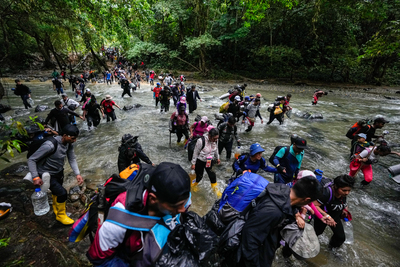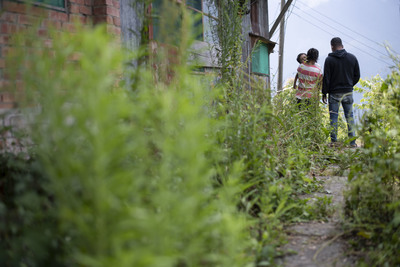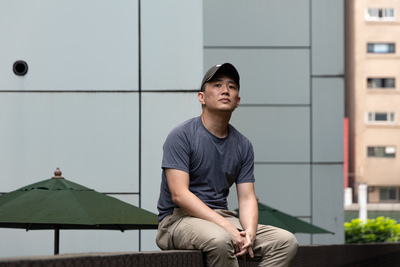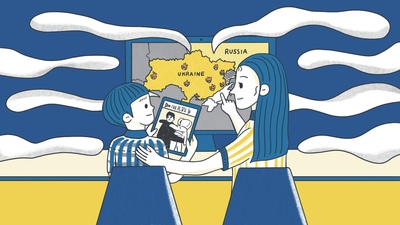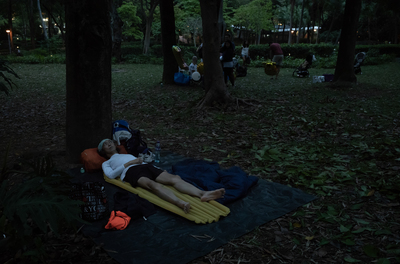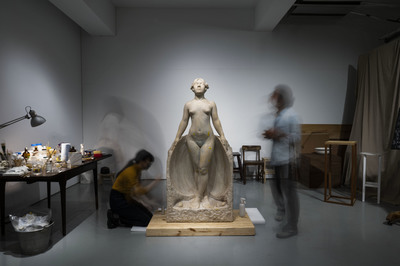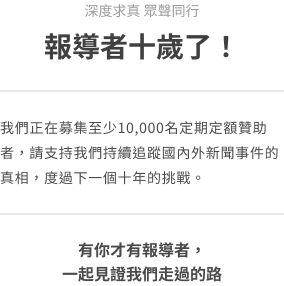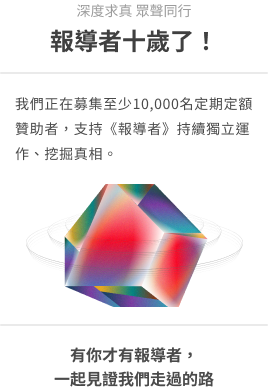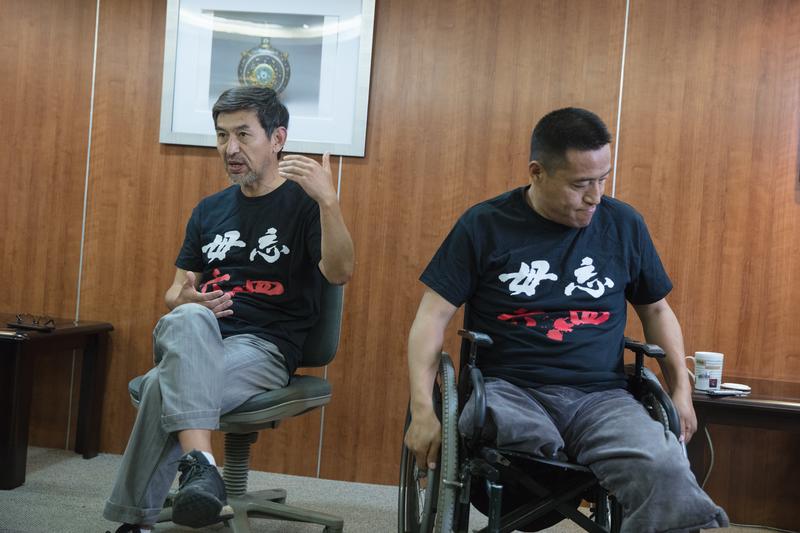
They were at different ends of the gun during the Tiananmen Square protests. One was a PLA soldier, the other a pro-democracy advocate. Fate arranged for them to meet in Taipei, 30 years later.
In May 1989, Li Xiaoming (李曉明) was a low-ranking officer with the PLA when martial law was declared. Fang Zheng (方政) was a soon to-be a university graduate.
On the morning of June 4, Fang's legs were crushed by a tank, while Li's unit stalled when ordered to enter Beijing. A day later, Li's unit was belatedly entering Tiananmen Square, while Fang's legs were amputated in a hospital eight kilometres away. They didn't meet during the crackdown.
In 2019, the two met in Taipei for the first time at an event hosted by the New School for Democracy. Li says he saw a pair of trousers riddled with bullet holes when he entered Tiananmen Square 30 years ago. He was so startled that he started sobbing, and couldn't even speak. Sitting in his wheelchair, Fang listens intently to Li's story.
"This is my first time hearing such a story, sitting here with you," says Fang. "It feels strange to say this, but I wasn't mentally prepared to hear something like that."
At the end of the talk, the audience applauds, and they extend their hands out to each other, grasping tightly.
If you shook hands with either of these men, you would know the strength of their characters. Li Xiaoming was born in 1964. Fang Zheng was born in 1966.
Three days after their speaking event, Li and Fang sat down with The Reporter — the first interview between a former PLA soldier responsible for enforcing martial law, and a victim of the Tiananmen Square Massacre. But this isn't a redress between the ruler's enforcers and its people, it's an opportunity for two activists who opposed Beijing's response to the Tiananmen Square protests to become "comrades-in-arms".
On the afternoon of June 3, 1989, a young Li Xiaoming peered out at the gloomy skies above the Sanjianfang Military Airport in Tong County (now Tongzhou District in suburban Beijing). He was part of the 2nd company of the 116th Division's 1st Armoured Division.
Two weeks prior, Premier Li Peng (李鵬) declared martial law, and his unit received orders to mobilize from Haicheng City in neighbouring Liaoning Province. He arrived at Tong county two days later, and moved into a military tent.
There was 24 hour security at Sanjianfang, and soldiers weren't allowed to leave camp. But someone brought a radio set inside, and they learned all about the student protests.
Li Xiaoming was a graduate of the military academy, and was in charge of the radar station. He didn't know how to face the students. As a soldier, he had to obey orders. but as a recent college graduate, he also identified with the young protesters.
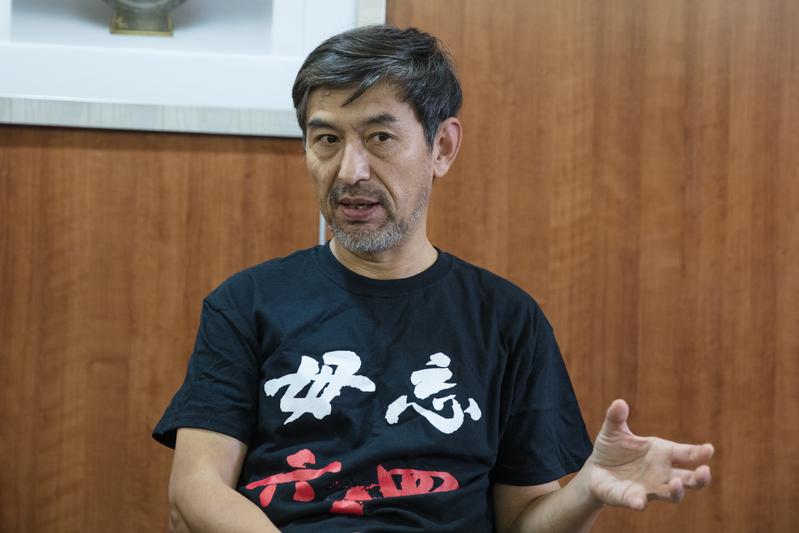
Li was confused, but he also realized the historical importance of this event, and he recorded his thoughts daily. At the time, his commanding officer said:
"We are the people's own army, and there is no way that we'll ever fire on our own people. Whoever shoots first will bear that responsibility to history."
When the orders finally came, they were dumbfounded about what they asked. Soldiers were to "exercise martial law at all costs", and were to arrive at Tiananmen Square on the morning of June 4.
As the 116th Division headed towards Beijing, an oppressive silence overtook the soldiers. Approaching the city outskirts, residents did everything to block them from entering the city centre. The 116th Division had no choice but to turn back, and find another route. Li Xiaoming says the 116th Division could've broken through if they wanted to, but decided to fall back instead. They received cheers and applause from the residents when they did so.
But the crisis continued to escalate. Their motorcade was now in a remote area of the city, and they were notified to take out ammo from the ammunition car, and load their weapons.
They already had guns in their hands when they left base camp, the officers carried Type 54 pistols, and the soldiers carried AK-47s. They opened the door to the ammunition car, and took out one ammunition box after another. One AK-47 cartridge carried 36 bullets, and soldiers didn't need to register for them, they could take them use at will.
At the same time, a small group of shocked onlookers started to take notice of the soldiers. Li Xiaoming felt miserable, he wasn't prepared to face this crisis head on.
That evening, the 116th Division struggled with what to do. The division leader, Xu Feng (許峰), asked several staff officers to change into civilian clothes, and accompany him on some reconnaissance work near Tiananmen Square. News also started coming in that other troop divisions had already opened fire on civilians. Li remembers that when Xu returned, he had a sombre look on his face. He told his troops "we weren't able to receive the orders from our superiors," and that nothing came in or out of their communications car.
In fact, a small receiver from an Anti-aircraft unit in the 1st Armoured Division was able to receive calls from the 116th Division.
At midnight, Li was awakened from his nap by the sound of a roaring engine. The road that was once blocked by a bus was now open, and an armoured vehicle roared past them at full speed to the centre of the city, with soldiers shooting in the air to intimidate the crowd.
The 116th Division took no action, but were finally able to confirm the horrible rumour — the "people's own army" was now firing on the people.
On the evening of June 3, Fang Zheng, still a student at the Beijing Institute of Physical Education (now Beijing Sport University), was in the centre of Tiananmen Square.
In mid-May, Just as Li Xiaoming's unit arrived on the outskirts of Beijing, Fang Zheng was visiting Tiananmen Square to sit in solidarity with his classmates. They sat together, went on hunger strikes, sang songs and gave speeches. Up to then, the troops and the government exercised considerable restraint with the students.
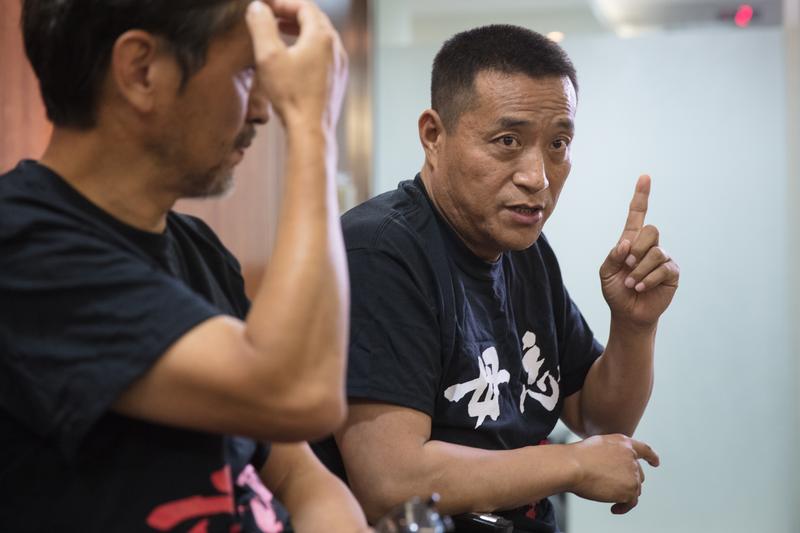
But by the morning of June 3, troops were trying to enter the square, and students and residents tried to block them from doing so. Pressed up against each other, they could only use songs to win the battle. As the soldiers withdrew to the Great Hall of the People, they won applause and praise from the students, and sang "Long Live the People's Liberation Army" as they marched away.
No one would have thought the order to "clear the square" would be given that evening.
Fourteen army and airforce groups, nineteen support groups, and a combined total of over 200,000 troops were mobilized from the Beijing and Tianjin Garrison Commands. Their orders were to enter Tiananmen Square from all sides, and were given permission to open fire on civilians — they were not to hesitate at any cost.
Gunshots rang out in the vicinity of Tiananmen Square; residents were gunned down from Muxidi and Xidan in the west, the Qianmen neighbourhood in the south, and Nanchizi Street in the east.
In an era without digital communication, the students in Tiananmen Square were largely unaware of what was happening around them. Fang Zheng and other students were still there at 10pm, and received word that the PLA would soon be upon them. Some had taken bloody clothes to the square and showed them to everyone. The atmosphere suddenly became tense.
At 11pm, a solitary armoured vehicle burst into the square. Students pelted it with molotov cocktails, leading it to drive erratically, colliding with everything.
Writer and Nobel peace prize laureate Liu Xiaobo (劉曉波) was an eyewitness to the events that night. In the documentary film "The Gate of Heavenly Peace" he said this about the scene:
All of a sudden, the loud speakers in Tiananmen Square started to broadcast an urgent notice to the martial law forces. It said the state had made its decision to suppress the counter-revolutionary forces, and they were not to hesitate at any cost. In just half an hour, more than a hundred thousand people had evacuated the square. The only people left were those standing beside the Monument to the People's Heroes. We were absolutely terrified.
By 2:30 in the morning, the PLA had surrounded the students in the centre of the square. Fang Zheng was one of them. He remembers that there were still three to four thousand students left. Some were from Beijing universities, others were students from outside the capital region. Fang was joined by 20 of his classmates from the Beijing Institute of Physical Education. Some of them sat by the Monument to the People's Heroes, while others sat around the Goddess of Democracy — a statue built by student protesters.
Liu Xiaobo, as well as Taiwanese singer and activist Hou Dejian (侯德健), tried to persuade the students to retreat at 3:30am. Hou got in a car and went looking for an officer in charge of the martial law forces, and asked him to negotiate with the students. A political commissar reported the situation to his superiors, and asked Hou to convince the students to leave the square.
In the end, students voted to leave, with one picking up a microphone to announce an immediate evacuation of the square. As they left, they sang "The Internationale" with tears welling up in their eyes.
The students fled in all directions. Fang Zheng was not a protest leader, and followed everyone else out of the square. A younger classmate of his was also at the scene, and he asked her to follow him.
They left Tiananmen Square from the south, then were forced to walk north. By 6am, they were only one kilometre away from the square, and just outside the gates of Zhongnanhai — the seat of political power in China.
As Fang Zheng walked on the roadway, he heard an explosion and smelled smoke behind him. Some people said troops were firing tear gas, but Fang has always thought it was some sort of poison gas shells. A shell went off beside him, releasing a yellow and green smoke. He couldn't see anything within a two to three metre radius, and felt dizzy and suffocated.
Fang tried to get himself and his classmate to a safe position on the sidewalk, and tried to push her over the one-metre railing separating the road from the pedestrian walkway. But just as he was doing so, a tank appeared through the smoke. Fang turned his head, but still couldn't see the tank in full view, just that it was in front of him.
As he pushed his classmate onto the walkway, Fang fell on the road, with his upper body still up against the railing. The tank crushed his legs, and rolled him up in the process. His entire body was jolted by the tank's caterpillar treads, and then dropped with a thud at the back of the vehicle.
"The entire thing happened in less than 15 seconds, from the poison gas shells hitting the ground, to me losing consciousness from the pain of being run over by a tank," said Fang.
Ten years later, someone showed Fang a photo taken on June 4, 1989. In the photo, the protagonist is leaning against an iron railing, with his trousers torn, and his legs bloody and broken. Bystanders blocked his face, but Fang could tell by the clothing that he was the person in the photo.
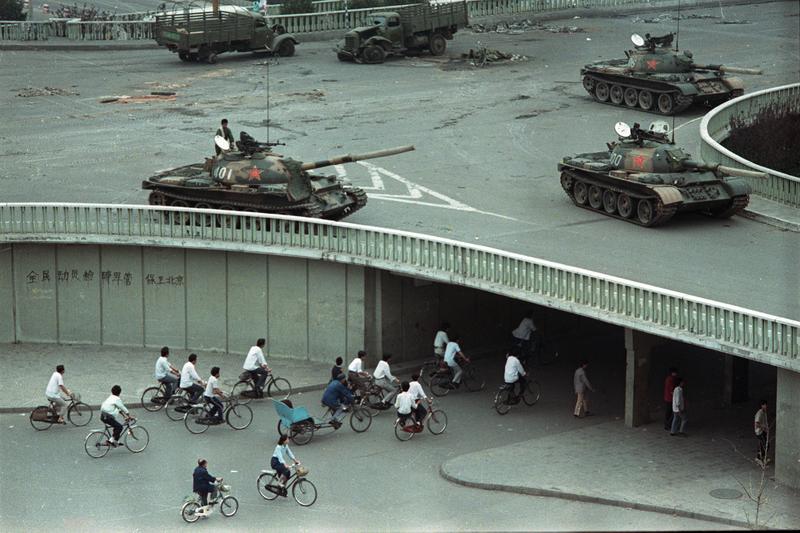
Some people at the scene jotted down the number of the tank that crushed Fang Zheng's legs -- "106". Scholar Wu Renhua (吳仁華) says the unit in question was from the Tianjin Garrison, and under the command of one Luo Gang (羅剛). His unit was responsible for 11 accounted deaths and many more serious injuries. Luo's unit is suspected of a number of unaccounted deaths as well.
Meanwhile, Li Xiaoming's unit was driving in circles on the outskirts of the city for the entire day. When they stopped in the evening beside a rice paddy, no one was in the mood to talk and barely anyone slept. But on June the 5th, at 6am, an operations director from the 38th Army rolled up to their position in an armoured vehicle, and escorted the 116th Division to Tiananmen Square.
After troops opened fire, there was almost no one on the streets of Beijing, and there were no road obstacles moving forward. But as they crossed an overpass, they heard screams of "fascists" and "butchers" and felt a rain of bricks from the surrounding buildings. A soldier in his unit named Li Wei (李偉) shot off a few rounds, pelting Li Xiaoming with the falling shells. Li Xiaoming yelled at him to stop, and Li Wei didn't shoot again that day.
Around 9am, the 116th Division arrived at the already devastated Tiananmen Square. Tank tracks scarred the marble steps leading to the Monument of the People's Heroes, and the square was littered with clothes and tents left by students. Li Xiaoming rummaged through the rubble and found a pair of bleck leggings and coat littered with bullet holes and blood. He didn't find a body, but a fellow soldier told him they found "a whole pile of bloody clothes" during the clean up.
In one traumatic incident near the square, Li says a company commander named Yu Xuejun (于學軍) ordered soldiers to disperse a crowd of stragglers near the Xinhua News Agency building. Yu ordered soldiers to shoot in the air to scare off the crowd, but Li later one soldier brag that he "offloaded an entire clip into the crowd." With one AK-47 clip carrying 36 bullets, "he would be responsible for more than a dozen casualties," said Li.
Eight kilometres away, Fang Zheng was waking up at Jishuitan Hospital. The pain was severe; his right leg was amputated to the upper thigh and his left leg was amputated to the knee. He heard from the medical staff, that he was first sent to Erlong Road Hospital, closer to the scene of the incident. But because of the severity of his injury, he couldn't be treated at Erlong.
He told medical staff he was a student at the Beijing Institute of Physical Education, leading the hospital to contact his school, who in turn contacted his family. Fang's family immediately made for Beijing from Hefei, the capital of rural Anhui Province.
By then, the situation was stable in Tiananmen Square. Li's unit was stationed in the area for two days, and was then ordered to enforce martial law in other parts of the city.
The 116th Division headed east towards the Beijing International Hotel near Fuxingmen Overpass. Out of nowhere, they heard gunshots from the top of the hotel, and the entire division got out of their vehicles. They knelt on the ground and fired at the building, sending shattered window glass to the ground. Li says the shards fell like glistening snowflakes. Bullets had even hit apartment building reserved for the foreign diplomatic core behind the hotel. The following day, many foreign embassy officials left Beijing for good.
On June 8th or 9th, anxious nurses told Fang Zheng that troops were about to take over the hospital, and arrest "counter-revolutionaries" who took part in the protests. Fang was still in poor health, and any movement would make his condition worse. So medical staff wheeled his bed into a power supply room, and locked the door.
After a while, nurses came back for Fang and told him it was a false alarm. It wasn't soldiers at all, but police from the public security bureau looking to question patients and staff. From that day on, Fang Zheng began a 30 year personal journey recounting his experience on June 4th, 1989.
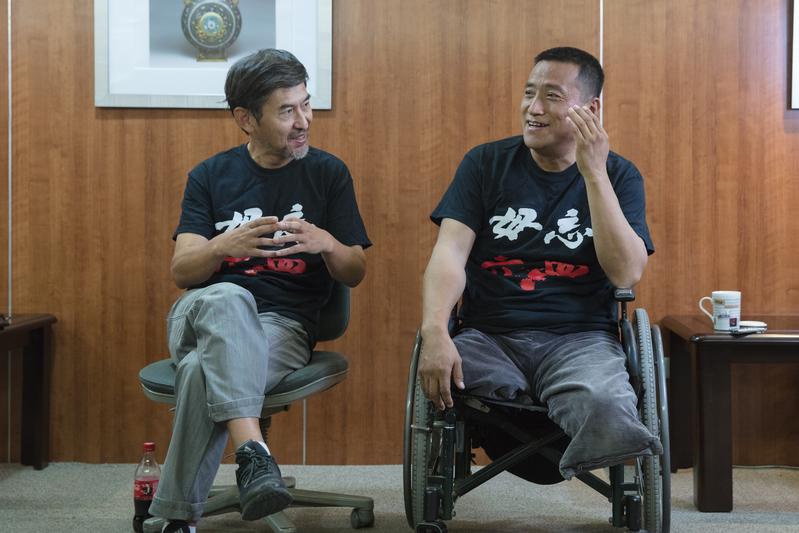
Fang Zheng left China more than 10 years ago, and Li Xiaoming has lived in Australia for nearly 20 years.
"The biggest difference between China and Australia is the authoritarian and democratic systems of government. In China, people love to say "you can't eat democracy", meaning that only economic development can guarantee the people's livelihood. But without democracy, there's no guarantee you'll ever have food to eat," says Li.
"If my son or daughter took to the streets, there's no way the government or the military would open fire on him."
"In the United States, children have a better future," says Fang Zheng, who now serves as the president of the China Democracy Education Foundation. Fang has three children of his own, with his eldest daughter already in university. He says he's never forced his daughter to take part (or not take part) in any political activity, and that she takes part in Tiananmen Square commemoration events of her own accord.
Li Xiaoming serves as the secretary-general for the China Overseas Democracy Coalition in Australia. He's sorted through photos and memorabilia from that time — including a medal commemorating his valour during the June 4th Massacre as a "Guardian of the People's Republic" — to a museum in Melbourne.
"The June 4th Massacre is not only a matter for Chinese citizens and individuals with a culturally Chinese background, it's the shared history of the entire world," says Li.
He's also written three volumes about his personal journey, one about his life in China, one about his time in Australia, and a third dedicated to China's martial law period in 1989. Li hopes that the government will one day provide redress for the victims of the Tiananmen Square Massacre, and that he can provide evidence about which soldiers fired at civilians, and which superior officers gave such orders.
But it's already been thirty years since the events of June 4, 1989; many young people in China have never heard of the Tiananmen Square Massacre, and older people are gradually forgetting the details of the event. Fang Zheng says it's hard to predict if there will ever be redress for the killings under President Xi Jinping (習近平).
In an era of digital totalitarian rule, overseas democracy activists can only establish a weak link with the public by jumping over the Great Firewall of China. Fang says it's nearly impossible to shake the foundation of the CCP's political power from the outside. All that can be done now is to keep the fire alive, and wait for an opportunity.
"The enemies of the CCP are here everyday, we don't need to encourage them to act. The CCP is constantly creating new enemies too. As rule becomes harsher, more problems will arise, and so will more enemies. No one is preparing for Xi Jinping to have a short rule. But if that day arrives, there might be a chance for something else."
(To read the Chinese version of this article, please click: 槍口兩端的六四記憶——當解放軍與受難者在台灣相遇 )
深度求真 眾聲同行
獨立的精神,是自由思想的條件。獨立的媒體,才能守護公共領域,讓自由的討論和真相浮現。
在艱困的媒體環境,《報導者》堅持以非營利組織的模式投入公共領域的調查與深度報導。我們透過讀者的贊助支持來營運,不仰賴商業廣告置入,在獨立自主的前提下,穿梭在各項重要公共議題中。
今年是《報導者》成立十週年,請支持我們持續追蹤國內外新聞事件的真相,度過下一個十年的挑戰。

